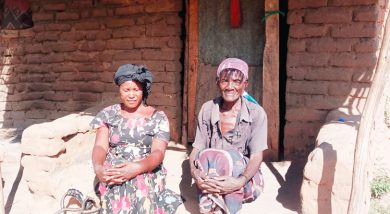Reflecting on the 16 Days of Activism against GBV campaign
Amid the 16 days of Activism Against Gender-based Violence (GBV) campaign, a man in Chief Kaphaizi’s area in Kasungu is alleged to have accidentally killed his three-year-old daughter after a panga knife he aimed at his wife, landed on their child’s head.
The man is said to have quarreled with his wife, and during the fight, he allegedly threw a panga targeting the woman, but it landed on the head of the baby who was at the back of her mother.
As the activities in the 16 days’ campaign are still at their peak, a Prophet is arrested in Mangochi for having sex with his 16-year-old biological daughter. Meanwhile, in Chikwawa, the media caught a man in action beating up his 21-year-old pregnant wife over marital disputes.
These stories, plus others reported almost daily in the media, raise questions about whether Malawi will win the battle against GBV.
Since 2000, Malawi has been observing 16 days of activism against GBV to raise awareness and call for the prevention and elimination of violence against women and girls.
The initiative, supported by the UN, this year falls from November 25 to December 10 under the theme ‘Unite! Invest to prevent gender-based violence in Malawi.’
GBV statistics in the country are alarming, with figures showing that, according to Unicef findings, a third of Malawian women have experienced physical violence since age 15, one-fifth have suffered sexual violence, and 42 percent of women aged 20- 24 were married before age 18.
UNFPA, in its 2022 Annual report released on July 25 2023, shows that the number of survivors accessing essential services for gender-based violence through its programs alone increased from 68 960 in 2021 to 129 688 in 2022.

But while these alarming statistics raise questions about whether activities aimed at fighting gender-based violence, including the 16 days of activism against GBV, are fruitful, African Women Leaders Network chairperson Emma Kaliya is upbeat that much has been achieved since the launch of the campaign.
She relates: “When we started, some rebuked us, saying we had started a political party, and now they acknowledge the tremendous work we have done, even though some say we haven’t achieved anything.
“But earlier, we were few doing this; now everyone, including chiefs and religious leaders, has joined the fight. I am optimistic we are going to defeat this evil.”
Gender-based violence is broad; it includes physical abuse, emotional abuse, child marriage, sexual harassment, among others.
T/A Mizinga of Machinga said through programs aimed at ending GBV supported by projects such as the Spotlight Initiative and Chilungamo program funded by the European Union, they can point out notable achievements, among them the establishment of chiefs’ forums at the district level.
“Through these forums, we have made sure that all defilement cases are reported to the police. Initially, we used to deal with such cases at the village level, and culprits were given lenient punishments.
“We have also terminated some harmful cultural practices, especially kusasa fumbi, kulowa kufa and fisi, which encourage young girls to engage in sexual activities after being released from initiation camps and a widow to sleep with a man to ‘clear’ her, respectively,” he explains.
Chiefs have also been instrumental in ending child marriages, with T/A Mizinga alone dissolving 89 marriages in 2023. Through gender projects implemented across the country, some areas have had the privilege of mobile courts where GBV cases are tried at the community level, thereby giving the chance to communities to understand the law.
NGO Gender Coordination Network board member Jessie Ching’oma, however, believes the country still needs to do more, especially in addressing GBV at the workplace and perpetrated towards children.
“There is a lot of GBV at the workplace, home, and even in schools. Our children are not safe; the people entrusted to protect the children are the ones abusing them,” she said.
She called for a concerted effort among the community, police, the judiciary, and parliament in addressing the vice.
Women Legal Resource Centre (Wolrec) executive director Maggie Kathewera Banda noted improved reporting on GBV cases as one of the milestones registered over the years.
“The public is now free to discuss and debate on issues surrounding GBV, and more players have come in to assist in addressing GBV. For example, we have seen the private sector also talking about addressing GBV in the workplace,” she said.
She, however, was quick to point out that the implementation of laws needs to improve, accountability mechanisms at all levels need to be put in place, which shows how government institutions, organizations, individuals, especially men, who are mostly perpetrators, are working to prevent GBV.
“GBV remains very high, and that should be a cause for concern to us as a country. Resources that would have been used for development initiatives go down the drain trying to address GBV, and yet this vice is preventable,” she added.
United Nations Resident Coordinator Rebecca Adda Dontoh, while acknowledging strides are being registered, hinted that violence against women and girls is becoming more normalised.
One in three women experiences physical and sexual abuse at least once in their lifetime, with 245 million women and girls, aged 15 years and older, globally experiencing p h y s i c a l a n d s ex u a l v i o l e n c e e a c h y e a r, perpetrated by a current or former intimate partner.
In 2022, nearly 89 000 women and girls were killed globally, the highest yearly number in the last three decades.
“These figures may be unsettling, but the harsh reality is that as the pushback intensifies against efforts to advance gender equality, and women’s empowerment simply puts violence against women and girls has not stopped,” she said.
Additionally, external shocks such as the Covid-19 pandemic, conflicts, and cl imate change have exacerbated gender-based violence, particularly sexual abuse against women and girls.
E u r o p e a n U n i o n Ambassador Rune Skinnebach describes the situation as unfortunate.
“Despite government efforts to tackle the issue testified by the adoption of several national laws, ratification of international conventions, and more importantly, despite the fact that most Malawians recognise GBV as the most important women’s right issue, the local GBV figures are still worrisome,” he said.
Skinnebach pledges more support in terms of funding towards projects that aim at eliminating GBV.
Minister of Gender, Community Development and Social Welfare Jean Sendeza says GBV violates fundamental human rights, particularly the right to life, liberty, security, dignity, non-discrimination, physical and mental integrity of a person.
“Further, GBV prevents an economy from growing to its full economic potential because resources are spent on goods and services related to GBV.” she says
She expresses t h e government’s commitment to ending gender-based violence and promoting gender equality across all spectrums through the implementation of several gender-friend ly l aws, policies, and strategies that create a conducive environment to address GBV and promote equality among men and women, boys and girls.
Some of the laws in place include the Gender Equality Act; Marriage, Div or c e and Fami l y Relations Act; Prevention of Domestic Violence Act; Child Care, Protection and Justice Act.
Sendeza believes more suppor t in terms of funding, awareness beyond the 16-day activism, and strengthening enforcement of the frameworks can help change the narratives.n





